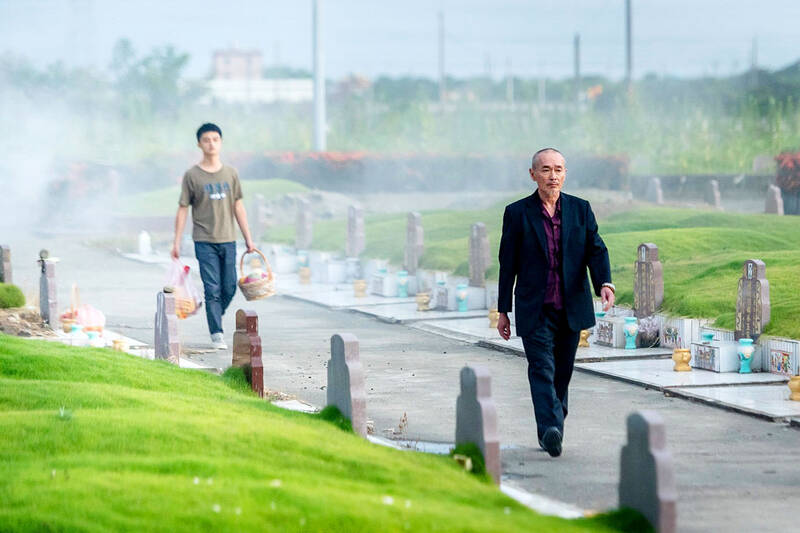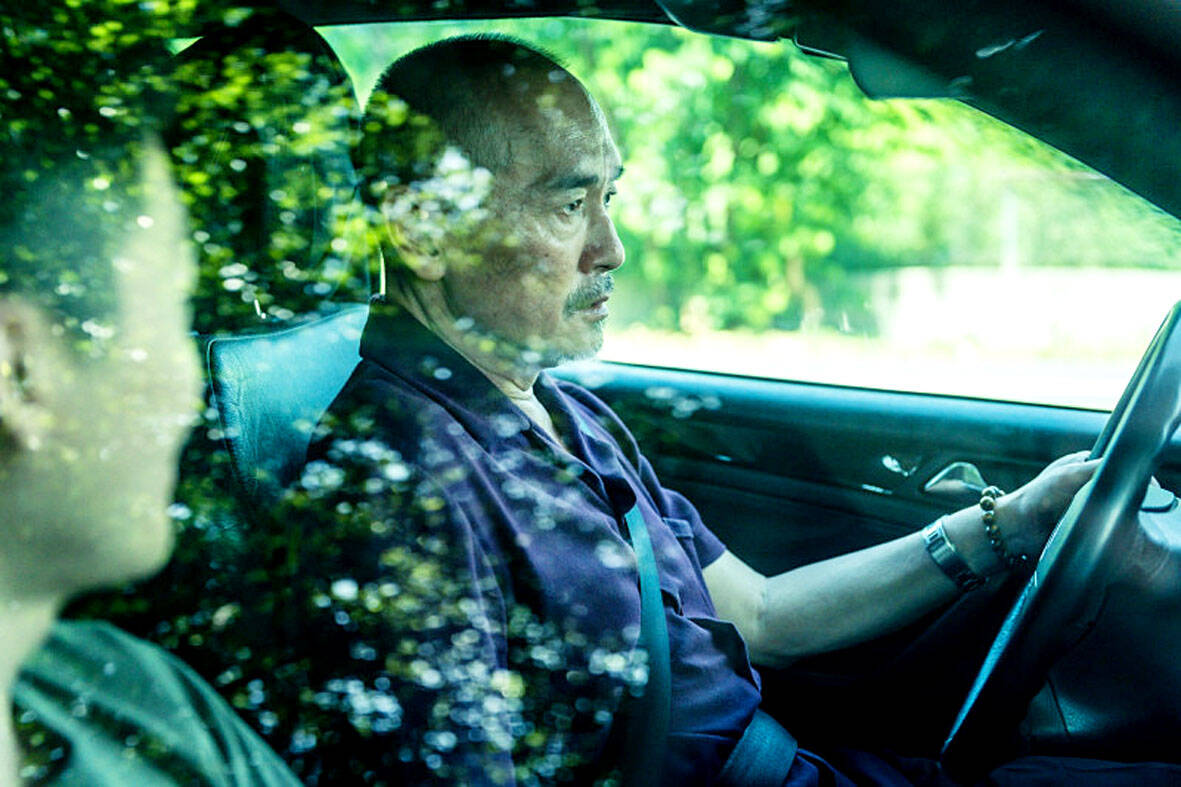Not much happens throughout most of this melancholy, slow-moving tale of despondency. But that’s the point of this film, featuring a father and son who live together but barely speak as they live through an empty existence filled with failed relationships.
The father, Ray (Lin Ju, 林鉅), has gambling and drinking problems, and he can only express his inner feelings to the mannequins in the mall where he works the graveyard shift as a security guard. He resorts to begging his ex-wife for money, and has no choice but to bear her berating.
Ray’s son, Dio (Huang Shao-yang, 黃劭揚), also works a menial job at a movie theater whose business has dwindled due to the COVID-19 pandemic. He pines for his coworker, but secretly takes photos of her and stalks her instead. Despite them being constantly on the move on a wide variety of vehicles, life seems to be going nowhere for both of them, and the suffocating despair grows as things continue to go downhill.

Photo courtesy of Greener Grass Production
The storytelling is restrained, revealing the background of the characters in bits and pieces and featuring long shots and minute details that accentuate the disconnect between the two. But deep down, they still yearn for better days and try in their own unsuccessful ways, which makes them all too human and sympathetic despite their shortcomings. The jazzy, atmospheric score pierces through the humdrum and hollowness of it all, working the mood effectively and driving the plot slowly forward.
It’s the first feature film for director Kaidi Zhan (詹凱迪), who based the plot on his relationship with his father. It’s reflective of many father-son relationships, especially in Asian families, where they care for one another but simply don’t know how to communicate. Zhan did not initially plan to set the story during the pandemic, but it just seemed to fit — Ray and Dio had been socially distancing from each other for their entire lives, he says. Interestingly, Huang also has a similar relationship with his father, but he’s said in interviews that he doesn’t think it’s a bad thing; it’s just how it is and they get along fine in their own way.
Surprisingly, this is Lin’s first major film role, as he’s better known as a painter. Although he’s had many cameos in the films of Hou Hsiao-hsien (侯孝賢), he was reluctant to take on a major role — but Zhan was convinced that he was the only man for the job. He visited Lin at his studio three times before he finally relented. Zhan’s insistence paid off, as the 62-year-old performs like a seasoned actor and handles the intricacies of such a subtle role well, becoming Golden Horse Film Festival’s oldest ever Best Newcomer nominee last year.

Photo courtesy of Greener Grass Production
Huang Jou-min (黃柔閩), who plays Ray’s ex-wife, also pulls her weight and delivers some emotionally hard-hitting moments in limited words and screen time.
Despite all the bright spots, Raydio is not the easiest film to watch — it’s almost unbearable at points, and fortunately it ends when it should instead of dragging into a nearly three-hour slugfest as many films of this kind do. It avoids becoming too depressing and meaningless, and the film is a promising start for Zhan.

This year will go down in the history books. Taiwan faces enormous turmoil and uncertainty in the coming months. Which political parties are in a good position to handle big changes? All of the main parties are beset with challenges. Taking stock, this column examined the Taiwan People’s Party (TPP) (“Huang Kuo-chang’s choking the life out of the TPP,” May 28, page 12), the Democratic Progressive Party (DPP) (“Challenges amid choppy waters for the DPP,” June 14, page 12) and the Chinese Nationalist Party (KMT) (“KMT struggles to seize opportunities as ‘interesting times’ loom,” June 20, page 11). Times like these can

June 23 to June 29 After capturing the walled city of Hsinchu on June 22, 1895, the Japanese hoped to quickly push south and seize control of Taiwan’s entire west coast — but their advance was stalled for more than a month. Not only did local Hakka fighters continue to cause them headaches, resistance forces even attempted to retake the city three times. “We had planned to occupy Anping (Tainan) and Takao (Kaohsiung) as soon as possible, but ever since we took Hsinchu, nearby bandits proclaiming to be ‘righteous people’ (義民) have been destroying train tracks and electrical cables, and gathering in villages

Dr. Y. Tony Yang, Associate Dean of Health Policy and Population Science at George Washington University, argued last week in a piece for the Taipei Times about former president Ma Ying-jeou (馬英九) leading a student delegation to the People’s Republic of China (PRC) that, “The real question is not whether Ma’s visit helps or hurts Taiwan — it is why Taiwan lacks a sophisticated, multi-track approach to one of the most complex geopolitical relationships in the world” (“Ma’s Visit, DPP’s Blind Spot,” June 18, page 8). Yang contends that the Democratic Progressive Party (DPP) has a blind spot: “By treating any

Swooping low over the banks of a Nile River tributary, an aid flight run by retired American military officers released a stream of food-stuffed sacks over a town emptied by fighting in South Sudan, a country wracked by conflict. Last week’s air drop was the latest in a controversial development — private contracting firms led by former US intelligence officers and military veterans delivering aid to some of the world’s deadliest conflict zones, in operations organized with governments that are combatants in the conflicts. The moves are roiling the global aid community, which warns of a more militarized, politicized and profit-seeking trend